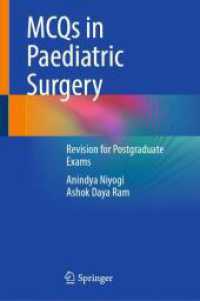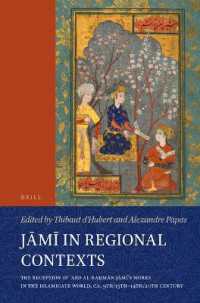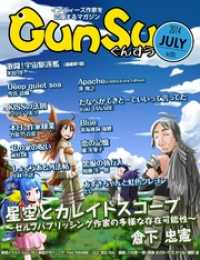Full Description
This open-access volume is the first to explore systematically and comprehensively the concept and category of 'horror' in antiquity. The contributors retrieve the ancient grammar of horror by paying equal attention to its affective and cognitive dimensions, and by looking at it as an embodied, enactive and full-rounded existential experience. They explore how horrifying experiences in antiquity are construed as embodied events while being conceptually rooted in cultural frameworks. They also showcase the ways in which the body itself can turn into a source of deep horror, be it in literary or medical texts and traditions in the Greek and Roman world, from the classical period to late antiquity.
While maintaining a firm awareness of the fact that 'horror', a largely post-Romantic concept, is not unproblematic when applied to Graeco-Roman antiquity, this collection of studies shows that our Graeco-Roman past can shed substantial light on the ways in which the horrific is understood today, as a category of art but also of life itself.
The eBook editions of this book are available open access under a CC BY-NC-ND 4.0 licence on bloomsburycollections.com. Open access was funded by the Exzellenzcluster ROOTS, Christian-Albrechts-Universität zu Kiel (Germany).
Contents
List of Illustrations
Acknowledgements
Introduction: Embodied Experience, Literary Representations and Human Knowledge: Horror in Greco-Roman Antiquity and its Legacy
1. Horror Now and Horror Then: Horror's Long Reach from Antiquity to Modernity and Back Again, Kathleen Noelle Cruz (University of California-Davis, USA)
2. Horror in the Odyssey: A Few Notes on Leodes' Beheading (22.326-329), Giulia Maria Chesi (University of Humboldt, Germany)
3. The Visceral Thrills of Tragedy: Flesh, Blood and Guts Off and On the Tragic Stage, Evina Sistakou (Aristotle University, Greece)
4. The Horrific Body in Sophocles, Glenn Most (University of Chicago, USA)
5. Naming the Monster: Forensic Horror and Collective Trauma in Cicero's Pro Roscio, Sophia Luise Häberle (University of Humboldt, Germany)
6. Fearful Laughter: Bodily Horror in Roman Sexual Humour, Jesse Weiner (Hamilton College, USA)
7. Cruor in flores mutabitur: Horrific Hybridisations in the Metamorphoses of Ovid, Aline Estèves (University of Montpellier, France)
8. Landscapes and Bodies of Horror in Seneca's Thyestes, Simona Martorana (University of Kiel, Germany)
9. The Vocabulary of Homicidal Horror in Libanius' Against a Murderer, Debbie Felton (University of Massachusetts Amherst, USA)
10. At the Borders of Horror and Science: The Social Contexts of Roman Dissection, Claire Bubb (Institute for the Study of the Ancient World-New York University, USA)
11. Overcoming Horror: 'Numbness' and Medical Agents. Some Thoughts on Medical Horror in Antiquity and Today', Lutz Alexander Graumann (Justus-Liebig-University Gießen-University Hospital, Germany)
12. Recipes for Horror in Greco-Roman Magic and Medicine, Sean Coughlin (Institute of Philosophy-Czech Academy of Sciences, Czech Republic)
13. Horror, Writing and Dissection in Sheridan LeFanu's In a Glass Darkly, Arden Hegele (Columbia University, USA)
Notes
Bibliography
Index rerum et nominum
Index Locorum







